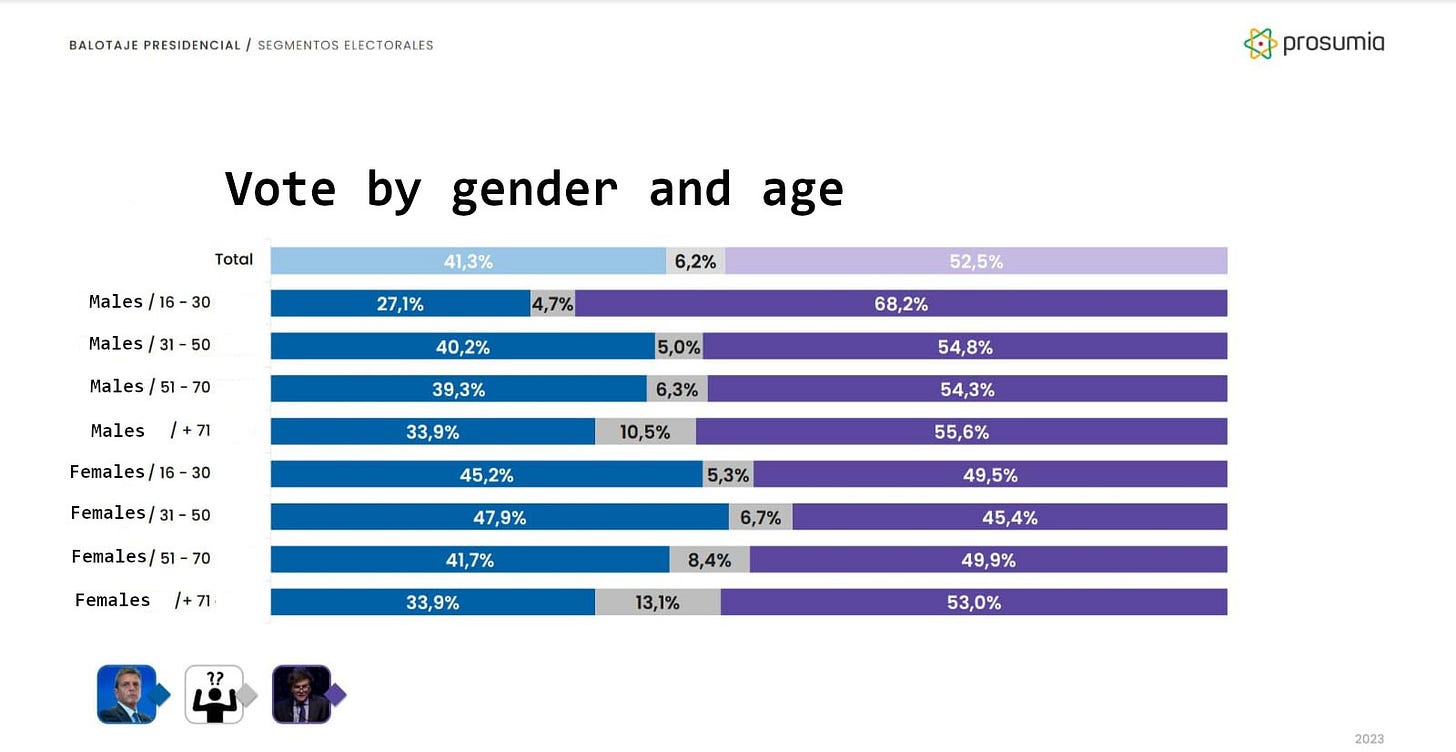Who exactly voted Milei into power?
Young men form the core of his support, but diverse votes from traditional parties were key to victory
This week’s feature is by Argentinian journalist Martina Jaureguy
Outsider candidate Javier Milei, who promised to use a chainsaw against public spending, rode to victory comfortably in presidential elections on November 19. Economic crisis, weariness of traditional politics, and the advance of the hard-right in Latin America generally, were certainly all factors in his victory. But who are the voters that led him to success?
In the general elections in Argentina on October 22, the current Minister of Economy, Sergio Massa, surprisingly came out as the winner. But in the ballot on November 19, Milei regained the first place he had obtained in the primaries. He seems to have benefited from the absence of Patricia Bullrich, of the right-wing alliance Juntos por el Cambio (Together for Change), who drew more traditional conservative votes in the first round.
"Ninety percent of Bullrich's vote ended up going to Milei, and very little of that support to Massa," sociologist Daniel Schteingart, director of the research center Fundar, explained to PWS.
Bullrich was Minister of Security under the center-right government of former President Mauricio Macri between 2015 and 2019. Bullrich was Minister of Security at that time. In the October primaries, Bullrich came in third thanks to "mostly anti-Kirchnerist" voters, Schteingart said.
Kirchnerism is the faction of Peronism now led by outgoing Vice President Cristina Fernández de Kirchner. Bullrich obtained 24% of the vote in the October primary; Milei, 30%.
After the October elections, Bullrich and Macri gave their support to Melei, who will take office on December 10.
Breakdown of Milei voters
According to Schteingart, Milei's voters are divided into two groups: "hardcore base", the 30% of voters who had supported him in the first round, and “ Bullrich's "borrowed" votes, as Schteingart described them.
Milei’s base is “a mostly male vote, with a greater predominance of young people," but from all socioeconomic levels, said the sociologist. The Bullrich voters who supported him “are mostly composed of older people, especially women, which offset the young and male bias of Milei's base,” he said.
"Where there is a clear gender cleavage is in the intermediate age bracket," said Schteingart.
According to a survey carried out before the ballot by the consulting firm Prosumia — one of the few that got the 11-point difference between the candidates right on Sunday — men between 16 and 50 years old "vote much more for Milei" than women of the same age range, the sociologist said based on the report.
The survey data show that, among men between 16 and 30 years old, 68% said they would vote for Milei on the ballot, against 27.1% who said they would support Massa. In the same age range, but among women, the responses were much more even, although Milei narrowly prevailed with 49.5% against 45.2% in favor of Massa.
Among those over 50, the estimated proportion of women and men voters is more even. "I think it's because in the under-50 age bracket is where the feminist agenda, about which Milei is very much against, permeated the most," Schteingart said.
Milei, among other things, stated during the electoral campaign that he wants to hold a popular referendum to eliminate the legalization of abortion passed in 2020. He has also promised to abolish the Ministry of Women, Genders, and Diversity created in 2019.
He describes the elimination as part of his fight against "cultural Marxism".
When asked in 2022 why he wanted to dissolve the Ministry, he replied "I'm not going to apologize for having a penis.”
What do Milei's voters do for a living?
Although Milei won the vote among almost all sectors of economic activity according to Prosumia's analysis, there were some he swept: the security forces and the armed forces.
Among the people with military occupations surveyed by the consulting firm, 9 out of 10 said they would vote for Milei on the ballot. More than 7 out of 10 members of police forces answered the same.
The vice-president who will accompany Milei, Victoria Villarruel, is a lawyer who comes from a military family implicated in crimes committed by the military dictatorship that ruled Argentina from 1976 to 1983. Villarruel is known for visiting military officers convicted of crimes against humanity such as Jorge Rafael Videla, leader of the junta that carried out the last coup d'état. On several occasions she has publicly defended military officers convicted of torture and murder, calling for their acquittal.
Milei also had significant support from self-employed people, with more than 30 percentage points of advantage over Massa. "That makes sense because these are people who generally have less state intervention, regulations, and state aid," Schteingart said.
Milei also won handily among laborers in industry and technology. "It's interesting because Peronism always had a more industrialist discourse than anti-Peronism, and Milei never talked much about industry," Schteingart observed. Milei is a staunch advocate of total market liberalization without any state regulation. This would cause many domestic factories and companies — and their employees — to be greatly affected by the opening of imports.
Are all Milei's voters “ultra-right”?
Although Milei's extremist discourse has earned him a loyal following, most of those who voted for him on Sunday's ballot do not entirely agree with his ideas.
"Very few agree with arms sales, with the organ market, with dollarization," Schteingart said. "Even the hardcore fans don't all agree, much less when you take into account the borrowed votes from Sunday."
What ended up prevailing in this election was not so much a desire for Milei to be the next president, but for Massa not to be, the sociologist said. For the last year, Massa has been in charge of Argentina's delicate economy, which in the last 12 months has accumulated an inflation rate of 150%. “Kirchnerism”, the philosophy of the ruling government, was strongly rejected.
"It is not that voters particularly liked Milei, but they rejected Massa because he was associated with Kirchnerism". Despite Massa's efforts to distance himself from the administration of current President Alberto Fernández and his vice-president, in the eyes of the electorate Massa is still part of Kirchnerism.
His last-minute tax cuts and economic benefits he implemented in recent months were not enough to win the election.
Milei, however, has softened some of his campaign rhetoric since winning the election, stepping back from promises to cut all trade with China, and perhaps dollarization as well.
But he has promised to honor his pledge to abolish the Central Bank, saying that the strategy is “non-negotiable”.
The Big Headlines in LATAM
On Thursday Mexico’s National Guard arrested the security chief of a faction of the Sinaloa cartel, Néstor Isidro Pérez Salas, also known as “El Nini”.
“El Nini” is accused of leading a bloodthirsty group of security forces charged with providing protection for the “Chapitos”, the sons of Joaquín “El Chapo” Guzmán.
The US had offered a reward of $3 million for information leading to his capture.
He is wanted by the U.S. on drug trafficking and weapons charges. The U.S. thanked Mexico for the operation on Friday.
Gustavo Petro in Colombia has floated the idea of importing natural gas and light crude from Venezuela. Venezuela’s oil reserves are 70 times larger than Colombia’s, which currently are predicted to last only 7 years without new exploration.
But Petro’s vows to implement a clean energy revolution are directly at odds with imports from Venezuela. Some environmentalists have criticized the plan, but Colombia’s state-owned oil company, ECOPETROL, has promised to study the issue, suggesting in public comments that gas imports could begin as early as the end of next year.
Ship’s Business
We’re preparing for the end of the year, as we imagine are all of you! We will be taking a break during the second half of December, as is our piratical custom. But don’t worry! We still have quite a few voyages planned before that, including something Joshua has been looking forward to for awhile: checking how our New Year’s predictions for 2023 panned out.
But before then, we have some features in the works, including one on migration from a new collaborator in Texas. Yippee-kay-yay, piratas!
Also we’re still trying to quit Twitter. PLEASE follow us on Instagram hahahah.
Spanish Word of the Week
Con paciencia y con maña, un elefante se comió una araña
Literal translation: With patience and skill, an elephant ate a spider
Perhaps the closest English equivalent is Little strokes fell great oaks
Great tasks aren’t accomplished overnight, they take time and planning. A bit of effort every day goes a lot further than a great effort quickly abandoned. And that’s what PWS has been about since the beginning. We’re reaching the two year anniversary of the launching of the Good Ship Capybara, and we hope one day to eat the spider!
For us, the spider is our goal of building a self-sustaining and truly independent media collective. And we’re getting there! If you’re reading this, you’re part of that. We’re grateful you decided to join us on the voyage.
Es dificíl, pero con paciencia y con maña, un elefante se comió una araña. (It’s hard, but with patience and skill, you can do it.)
Hasta pronto, piratas!





